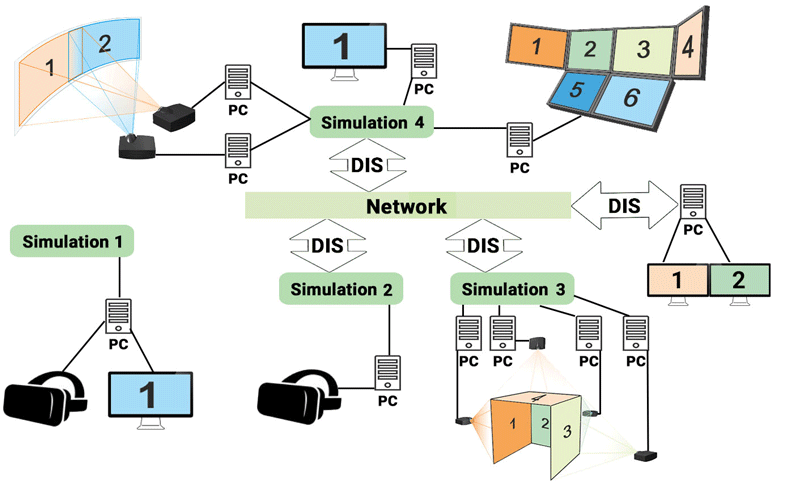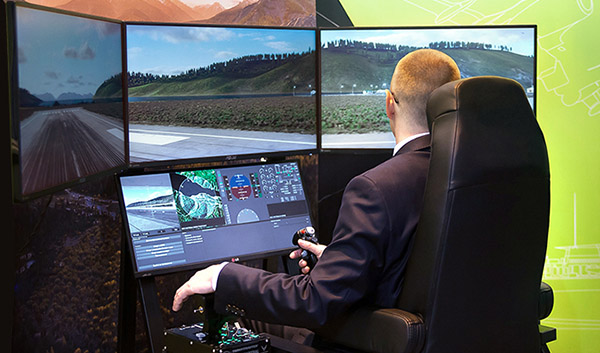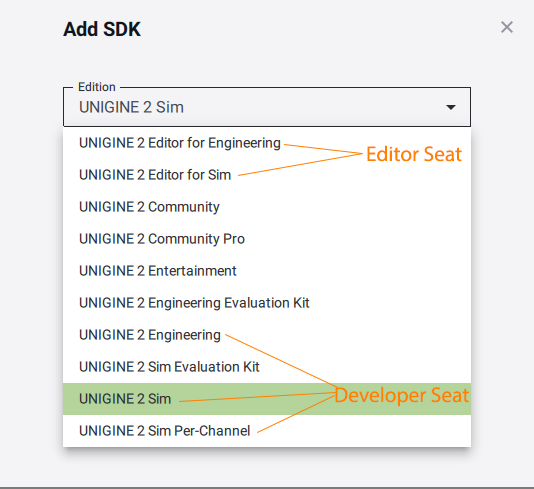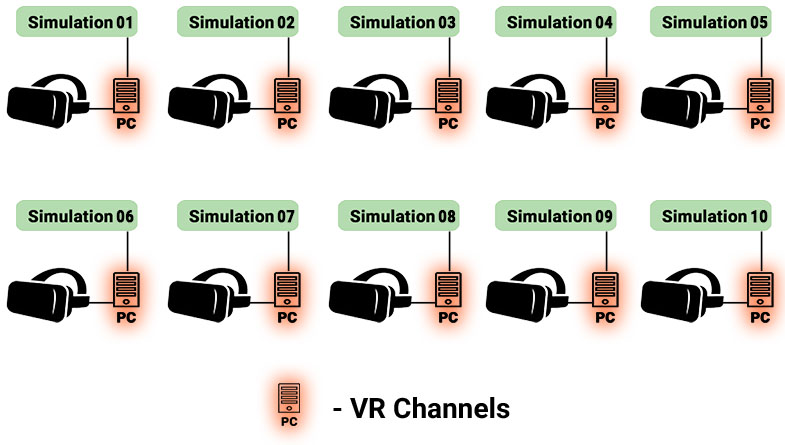如何计算座位和频道

The image demonstrates two types of arrangement. Simulation 1 requires only 1 VR Channel to run the application, and there's no network connection. A complex network of Simulations 2-4 and one PC with two monitors has 10 running PCs (instances of the application) in total, and therefore requires 10 channels. Considering the network connection available, these 10 are VR Channels.该图像演示了两种类型的排列。 模拟1号只需要1个VR通道来运行应用程序,并且没有网络连接。 模拟2到4号和一台带有两台显示器的PC的复杂网络总共有10台正在运行的PC(应用程序的实例),因此需要10个通道。 考虑到可用的网络连接,这10个是VR通道。
Counting Channels计数通道#
Depending on your project's requirements and the final setup, your application may have several different views to render, such as:根据项目的要求和最终设置,您的应用程序可能有几个不同的视图要呈现,例如:
- Out-the-window view for the cockpit having 4 windows each represented by a separate monitor驾驶舱的窗外视图有4个窗口,每个窗口由一个单独的监视器表示
- Electro-Optical/Infra-red (EO/IR) sensor光电/红外线(EO/IR)传感器
- Radar雷达
- Dashboard with simple gauges and instruments仪表板与简单的仪表和仪器
- Rearview mirror后视镜
- Instructor Operator Station (IOS)教师操作员站(IOS)
But how many channels is that?但这是多少个频道?
Each runtime (instance of the released application) that requires a separate computer to render a certain view or a part of a view (in case of multi-monitor/multi-projector setup) requires its own individual Channel. If you use the Wall preset of the SpiderVision Plugin, then one instance is one PC, on which the application with this plugin is running (not the number of monitors used).每个运行时(发布应用程序的实例)需要一台单独的计算机来渲染某个视图或视图的一部分(在多显示器/多投影仪设置的情况下),需要它自己的单独通道。如果您使用SpiderVision插件的Wall预设,那么一个实例是一台PC,在此插件的应用程序正在运行(而不是使用监视器的数量)。
Simply put, we should define how many separate views we want to have. For example, a simple plane simulator with a three-screen out-the-cabin view, with a dashboard, radar, and an IOS (Instructor Operator Station) will be implemented by running 6 application instances. For a rear-view mirror or a simple additional camera producing a low-resolution image no additional channel is instance - that is implemented by an additional camera with a viewport. Thus, for such a setup we require 6 channels. And these channels should be IG Channels, as synchronization between them is required to render coherent images.简单地说,我们应该定义我们想要有多少个单独的视图。 例如,一个简单的飞机模拟器,具有三屏舱外视图,带有仪表板,雷达和IOS(教练操作员站),将通过运行6个应用程序实例来实现。 对于产生低分辨率图像的后视镜或简单的附加相机,没有额外的通道是实例-这是由带有视口的附加相机实现的。 因此,对于这样的设置,我们需要6个通道。 这些通道应该是IG通道,因为它们之间的同步需要渲染相干图像。

Of course, it is possible to combine several views and render them on a single PC, but only if the rendering load won't get too heavy (e.g. sensors and gauges displaying data rendered in low resolution or a rearview mirror rendered as a picture-in-picture). If rendering load becomes too high, a single computer might become unable to provide the required image at the required framerate, in this case the channel has to be split. An attempt to save on additional channels may result in performance and quality degradation, so please be aware that choosing an appropriate number of channels is essential for the successful implementation of your project. For example, if the truck simulator setup has four 4K monitors (two for the windshield and one for each side window) that'll end up with 16K pixels to be rendered, which might be too much for a single channel (a single PC with the Wall arrangement of displays used).当然,可以组合多个视图并在单个PC上渲染它们,但前提是渲染负载不会太重(例如传感器和仪表显示以低分辨率渲染的数据或后视镜呈现为画中画)。 如果渲染负载变得过高,单台计算机可能无法以所需的帧速率提供所需的图像,在这种情况下,必须拆分通道。 尝试节省额外的通道可能会导致性能和质量下降,因此请注意,选择适当数量的通道对于项目的成功实施至关重要。 例如,如果卡车模拟器设置有四个4k显示器(两个用于挡风玻璃,每个侧窗一个),最终将呈现16k像素,这对于单个通道(用Wall排列显示器的单个PC机)来说可能
Decide on your setup, define what and how you plan to visualize - count all instances with significant rendering load (generation of high-resolution images for out-the-window views, high-resolution radar, and so on). Each of these instances should be rendered by a separate computer (otherwise too heavy load may lead to lags, which is totally unacceptable for a simulator).决定您的设置,定义您计划可视化的内容和方式-计算具有显着渲染负载的所有实例(为窗外视图生成高分辨率图像,高分辨率雷达等)。 这些实例中的每一个都应该由单独的计算机呈现(否则太重的负载可能会导致滞后,这对于模拟器来说是完全不可接受的)。
Counting Seats数座位#
Seats are required for developers and can be compared with an office chair for simplicity: if two persons work in different shifts they can share the same workplace.开发人员需要座位,为了简单起见,可以将座位比作办公椅:如果两个人轮班工作,他们可以共享同一个工作场所。
Some developers (such as artists) only need the Editor for work: they just assemble scenes and don't develop any logic. For such cases, there's Editor Seat, an option that allows working in the Editor.一些开发人员(如艺术家)只需要编辑器进行工作:他们只是组装场景,不开发任何逻辑。 对于这种情况,有编辑器的座位,一个允许在编辑器中工作的选项。
To use both Developer Seats and Editor Seats, SDK Browser should be installed and running on the PC, and the corresponding version of SDK should be downloaded and activated.要同时使用开发人员席位和编辑器席位,应在PC上安装并运行SDK浏览器,并下载并激活相应版本的SDK。

Thus, if you team has 1 artist and 3 programmers, one of which is working a night-shift, 2 Developer Seats and 1 Editor Seat might be enough for you.因此,如果你的团队有1个艺术家和3个程序员,其中一个是夜班,2个开发人员席位和1个编辑席位可能就足够了。
Testing the Application测试应用程序#
On a certain development stage, you require to test your application with a final arrangement. If this is an application that is run using Channels, you may come up with the following arrangement:在某个开发阶段,您需要通过最终安排来测试您的应用程序。 如果这是一个使用通道运行的应用程序,您可能会提出以下安排:
Run the master instance using a Seat license (the PC should have SDK installed on it), and use Channel licenses for slaves (these PCs won't require installing SDK).使用座位许可证运行主实例(PC上应该安装SDK),并为从属设备使用通道许可证(这些Pc不需要安装SDK)。
Use Cases用例#
Let us review some typical examples of simulator setups and count channels for them.让我们回顾一下模拟器设置的一些典型示例,并为它们计数通道。
Railway Simulator铁路模拟器#
A train driving simulator with high-resolution displays may have the following setup:具有高分辨率显示器的火车驾驶模拟器可能具有以下设置:
- Set of 3 monitors (1 for the windshield and 1 for each side window)一套3个监视器(挡风玻璃1个,侧窗1个)
- Two rearview mirrors两个后视镜
- Dashboard仪表板
Total: 3 separate channels (one per window). Rearview mirrors can be rendered as picture-in-picture.总计:3个独立通道(每个窗口一个)。 后视镜可以呈现为画中画。
Simple Helicopter Simulator简单的直升机模拟器#
Simple CIGI-based single-user helicopter simulator with the following setup:简单的基于CIGI的单用户直升机模拟器,具有以下设置:
- Out-the-window view for the cockpit having 4 windows each represented by a separate monitor驾驶舱的窗外视图有4个窗口,每个窗口由一个单独的监视器表示
- Electro-Optical/Infra-red (EO/IR) sensor光电/红外线(EO/IR)传感器
- Radar雷达
- Dashboard with simple gauges and instruments仪表板与简单的仪表和仪器
- Instructor Operator Station (IOS)教师操作员站(IOS)
Total: 4 channels for windows, 1 for IOS, 1 for sensor, radar, and dashboard, with the need to exchange data via network, which totals to 6 IG Channels.总计:4个用于windows的通道,1个用于IOS,1个用于传感器,雷达和仪表板,需要通过网络交换数据,总共6个IG通道。
VR ClassroomVR教室#
Let's review a VR classroom or some sort of a virtual laboratory with 10 independent computers, each having a VR headset connected. Each user has their own isolated simulation. 让我们回顾一下VR教室或某种虚拟实验室,其中有10台独立的计算机,每台计算机都连接了VR耳机。 每个用户都有自己的独立模拟。

Total: each computer has an HMD, requiring a single VR visual channel per computer. So, we need 10 VR-channels (as computers do not interact with each other via network).总而言之:每台电脑都有一个HMD,需要每台电脑一个单一的VR视觉通道。因此,我们需要10个VR通道(因为计算机不通过网络相互交互)。
本页面上的信息适用于 UNIGINE 2.19 SDK.
